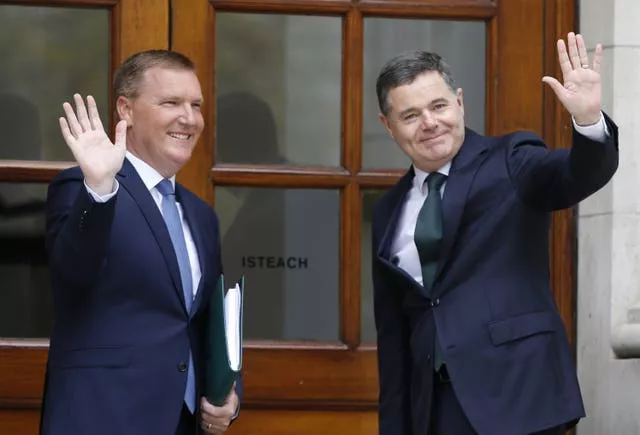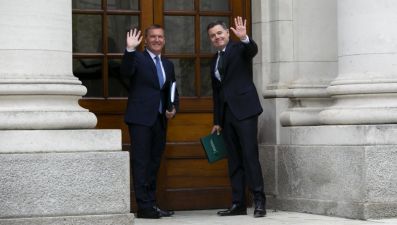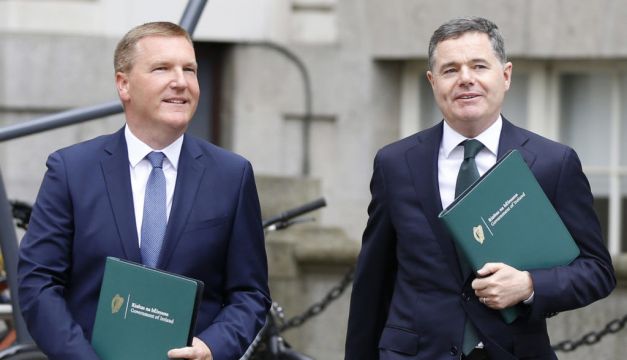The Minister for Finance has unveiled the Government’s €11 billion budget package to help households and businesses tackle the soaring cost of living.
Paschal Donohoe told the Dáil that while the country emerged from the Covid-19 pandemic last year, it is now facing a further economic challenge.
In what is one of the State’s most significant budgets in years, Mr Donohoe pledged that the multi-billion euro package will help families, individuals and businesses.
Among the measures announced on Tuesday include a cut to childcare costs, hike in welfare payments, supports for renters and energy credits for households.
Read more: Main points from Budget 2023
The pressure has been on the coalition government for months to get the balance right as bills for energy, fuel, groceries and housing soar.
Mr Donohoe said that pensioners have to spend more to heat their homes, families are facing higher grocery bills while businesses are trying to cope with energy costs as a result of the energy crisis.
“This is why, Budget 2023, presented by Minister (Michael) McGrath and I today, is and must be a cost-of-living budget, focused on helping individuals, families and businesses to deal with rising prices,” Mr Donohoe said.
Mr Donohoe announced once-off measures worth €4.1 billion accompanied by budgetary measures for 2023 worth €6.9 billion.
It brings the total size of Budget 2023 to €11 billion. He said the figures were “significant”, but so was the need.
💼𝐈𝐍𝐓𝐑𝐎𝐃𝐔𝐂𝐈𝐍𝐆 #Budget2023💼
Later this afternoon, Ministers @Paschald and @mmcgrathtd will unveil a Cost of Living Budget for individuals, families and businesses.
Find out what the Government has prioritised here👇 @IRLDeptFinance @IRLDeptPER pic.twitter.com/NDiRbf5CXI— MerrionStreet.ie (@merrionstreet) September 27, 2022
Mr Donohoe also said that in drafting the Budget, the government has a responsibility to “strike a delicate balance” between helping with the cost-of-living pressures, but also “not making them worse by adding fuel to the inflationary fire”.
“For future years, we will aim to stay within the parameters of the medium-term budgetary strategy set out last year,” Mr Donohoe added.
“This will allow us to provide for steady improvements in public services and sustainable reductions in personal taxation while still ensuring that our public finances remain on a positive trajectory.”
As part of the budget, the government will introduce a new rent tax credit of €500 per year for renters.
“This measure, aimed at those who do not get any other housing supports, will apply for 2023 and subsequent years but I am providing that it may also be claimed in respect of rent paid in 2022,” Mr Donohoe said.
Approximately 400,000 people are expected to benefit from the measure.
#Budget2023 will see €2 billion set aside for the National Reserve Fund and €4 billion in 2023. This will help protect our economy from unexpected shocks. pic.twitter.com/YNNp1WyqSq
— Fine Gael (@FineGael) September 27, 2022
Minister for Public Expenditure Michael McGrath confirmed that every household will receive energy credits totalling €600 paid across three instalments.
The first will be paid before Christmas while two other instalments will be paid next year.
All social welfare payments will also go up by €12. A lump sum of €400 will also be made to those who receive the weekly fuel allowance before Christmas.
Those who receive a weekly social welfare payment will receive a once-off double payment next month. This will go to pensioners, carers, people on disability payments and jobseekers.
Those in receipt of the Working Family Payment will get an additional lump sum of €500 in November. A double child benefit payment worth €140 per child will be made in November.
Those in receipt of the Carer’s Support Grant will get a €500 payment in November, while a one off-payment of €200 will made to those in receipt of the Living Alone Allowance.
Student fees will be slashed by €1,000, and a once-off double monthly payment for those who receive the Susi grant.
The 20 per cent reduction on transport fares will continue into next year, the Dáil was told.
The total cost of cost-of-living measures amounts to €2.2 billion, Mr McGrath said.
Childcare costs will also be slashed by 25 per cent for centres registered under the National Childcare Scheme.

The cost to the state will be some €121 million while the measure is set to save families up to €175 a month.
The finance minister also confirmed that the 9 per cent VAT rate for the tourism and hospitality sector will end February next year.
Meanwhile, the Government will also cut the VAT on newspapers from January 1st, while the VAT on defibrillators will also be removed.
Mr Donohoe said that the government will bring in its own windfall tax on energy companies if Ireland cannot be part of the EU measures that are currently underway.
“It is not fair for companies to earn excess profits from the current volatility in the market,” he added.
Excise duty will also be increased on a pack of 20 cigarettes by 50 cents.
Mr Donohoe announced a extension to the current excise reduction of 21 cents per litre of petrol, 16 cents per litre of diesel and 5.4 cents per litre in respect of marked gas oil and the 9 per cent VAT rate for electricity and gas until February 28th.

There will be an increase of €3,200 in the income tax standard rate cut-off for all earners to €40,000 for single individuals, while it will rise to 49,000 for married couples and civil partners.
The home carer tax credit will rise by €100 to support stay-at-home parents.
Mr Donohoe also said the Help-To-Buy scheme will continue at the current rates until the end of 2024.
He told the Dáil that he will keep the scheme under review and will consider a number of recommendations made in a report on the scheme.
Vacant homes tax
Mr Donohoe also said he will bring in a vacant homes tax to “increase the supply of homes for rent or purchase to meet demand”.
The tax will apply to residential properties which are occupied for less than 30 days in a 12-month period.
He also announced a number of measures to help businesses through the cost-of-living crisis.
“I am introducing a Temporary Business Energy Support Scheme to assist businesses with their energy cost over the winter months,” Mr Donohoe said.
“The scheme will be open to businesses that carry on a Case 1 trade, are tax compliant and have experienced a significant increase in their natural gas and electricity costs.
“It is proposed that the scheme will operate by comparing the average unit price for the relevant bill period in 2022 with the average unit price in the corresponding reference period in 2021.
“If the increase in average unit price is more than 50% then the threshold would be passed and the business would be eligible for support under the scheme.
“Once eligibility criteria are met the support will be calculated on the basis of 40% of the amount of the increase in the bill amount.
“A monthly cap of €10,000 per trade will apply and an overall cap will apply on the total amount a business can claim.”
Mr Donohoe also said he will direct €2 billion into the national reserve fund and €4 billion in 2023.

“Following so soon after Brexit and Covid, it is a major achievement for our country to be in a position to put additional resources aside in order to prepare for future challenges and to run a surplus,” TDs were told.
He said major challenges are coming in the form of an ageing population, the digital transition and climate change, so therefore it is “imperative” that the Government prepare public finances are appropriately.
Funding is also being pumped into the justice department to recruit a further 1,000 gardaí into the garda college next year.







